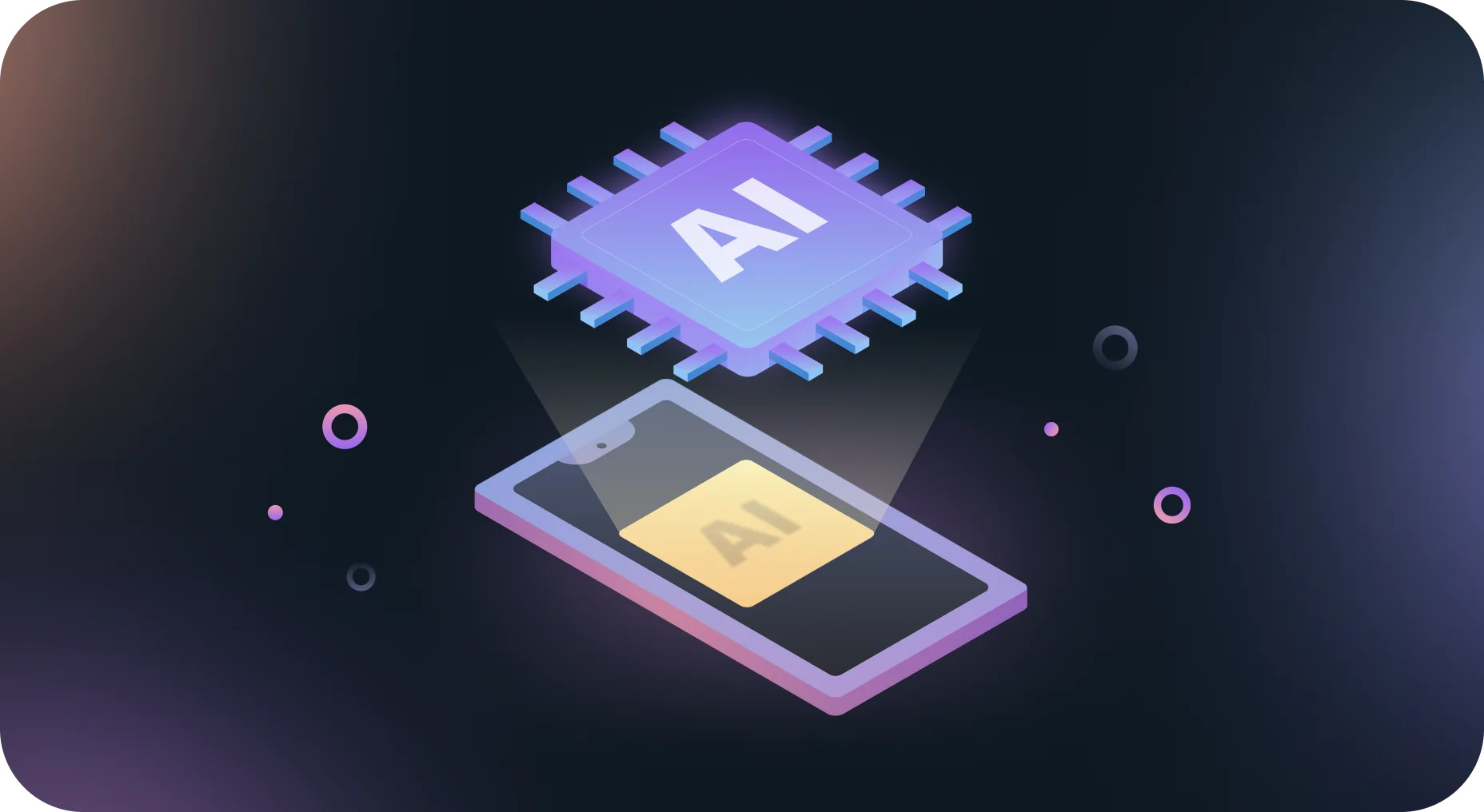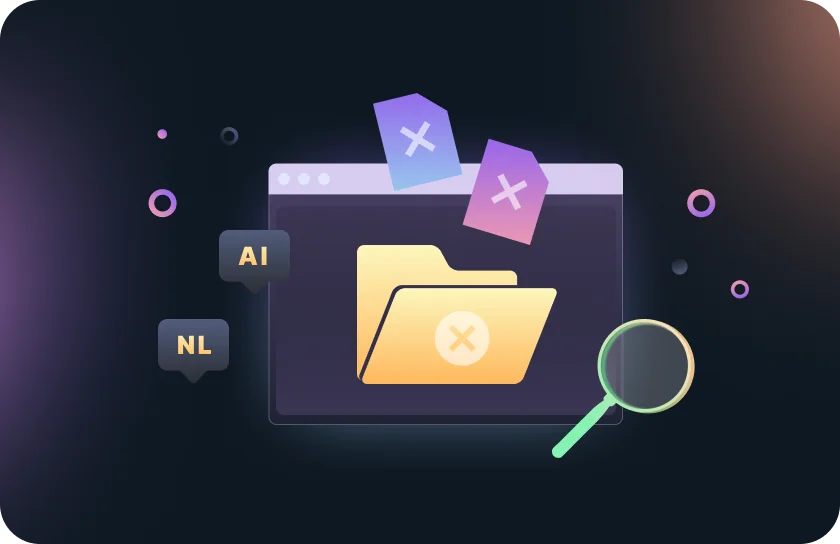Table of contents
At this point, using AI in small business has become a mandatory requirement. There is just no other way to gain a competitive advantage. The level of competition in every industry is skyrocketing, so you must cut your costs and optimize every possible process. This is precisely what AI can do for small businesses, and we’ll tell you how today.
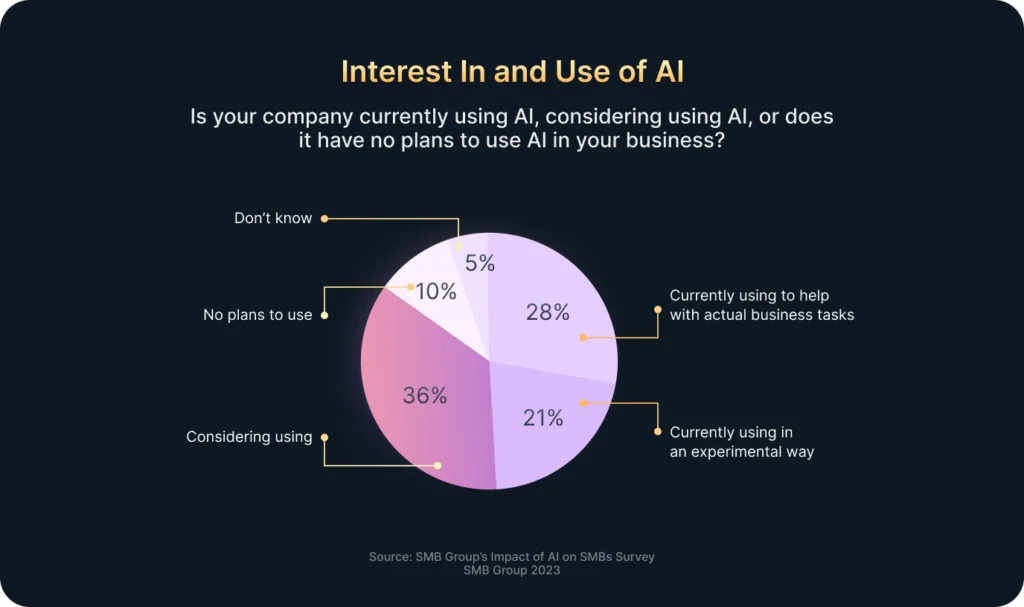
Using AI in Small Business: Practical Tips from Professionals
Leveraging AI tools can be troublesome for many SMBs because they need help figuring out where to start. Devtorium offers a range of AI software development services, and our developers have expertise in implementing AI into various systems. In this post, they will demystify AI for small businesses, providing insights and examples of successful AI usage.
Bear in mind, that the majority of businesses are either already using or consider implementing AI solutions already. Take a look at stats in the graphs to see what position your company matches currently.
Let’s start with a few general tips to consider when using AI in small business:
- Start small
First, you should begin with only targeted AI applications that align with your business goals and resources. For example, if you have an e-commerce site, add a chatbot to enhance customer experience. - Data quality matters
For AI to work accurately, you must be sure that training data is clean and relevant. It’s crucial for minimizing the risk of bias in AI outcomes. - Monitor your ROI
Your BA must analyze all AI projects’ return on investment (ROI) to ensure they deliver value to your business. - Collaborate with experts
Partner with AI specialists or consultants to navigate complex implementation challenges.
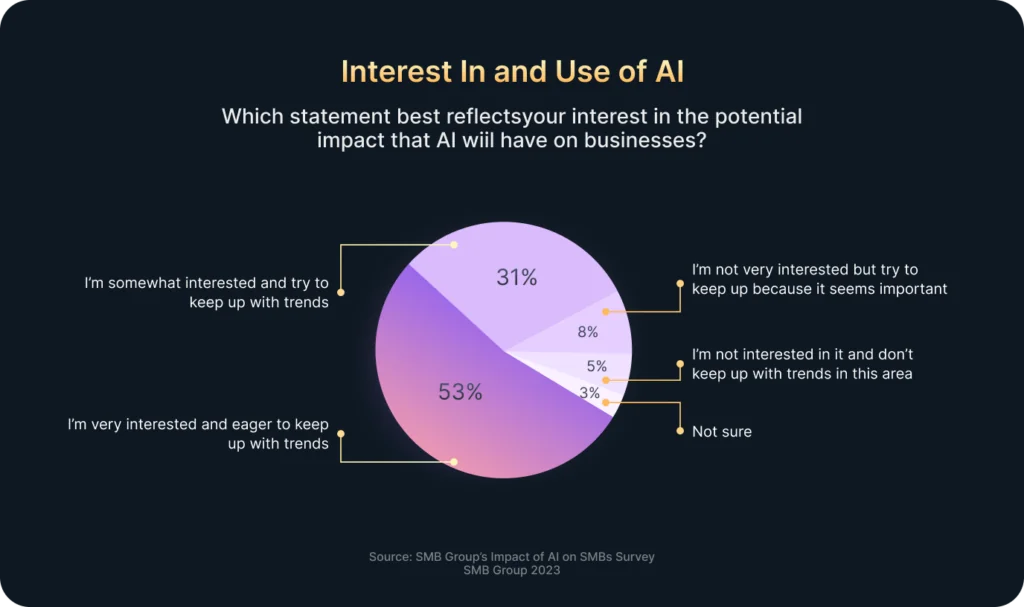
Real-World Implementations of AI in Small Business
Improving Customer Experience
Adding an AI chatbot to your website or service is the best AI innovation to start with. This virtual assistant can solve many tasks, from answering users’ frequently asked questions to assisting with product recommendations based on their behavior. Moreover, chatbots can learn and adapt over time. Therefore, their accuracy and efficiency in handling customer queries will improve.
Virtual assistants can cut the workload of your human support staff. In turn, they will have time to focus on more complex tasks. Besides, these AI solutions can gather valuable data on customer interactions. Use them as an analytics tool to learn about your audience and make better-targeted business decisions. For example, you can identify trends, understand customer needs, and improve your services overall.
To start using such a chatbot, small businesses can try services like Dialogflow by that uses Google Al. You can also try to make your own chatbot with LangChain. If you want to go to the next level, check out our case of what a voice bot can do.
Supply Chain Management
Some fantastic ways of using AI in small business that deals with logistics include:
- Optimizing delivery routes optimization
- Reducing transportation costs
- Cutting down on delivery times
- Increasing logistics efficiency
Also, you can use AI to evaluate supplier performance and manage relationships, ensuring the best terms and reliability. AI-driven supply chain management systems leverage advanced algorithms to analyze vast amounts of data and make real-time decisions that enhance operational efficiency.
AI can also enhance predictive maintenance in logistics. This is done by using data from IoT sensors to anticipate equipment failures and schedule proactive repairs. With this tech, you can minimize downtime and improve your business’s overall reliability.
Moreover, AI-powered demand forecasting models help anticipate customer needs more accurately. Therefore, businesses can adjust production schedules and inventory levels accordingly. By optimizing these processes, AI contributes to cost reduction and enhances the agility of supply chain operations.
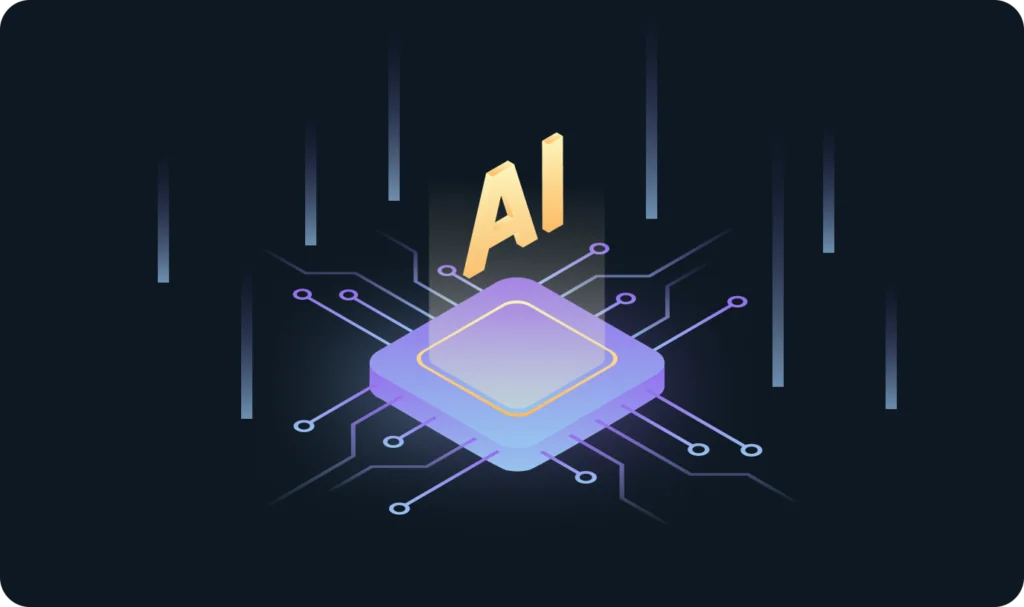
Predictive Analytics
One of the best ways to use AI in small business is implementing predictive analytics to analyze your past data and identify patterns. These tools enable you to forecast sales trends, which can make a crucial difference in achieving success.
Efficient use of predictive analytics can help you come up with effective strategies and prevent rash decisions. Furthermore, predictive analytics can optimize inventory management by forecasting demand and caution about overstock or stockouts.
In addition, these AI systems can analyze sales data to identify seasonal trends and customer behavior patterns. You can utilize tools like Salesforce Einstein Analytics to anticipate market shifts.
Visual content
You should consider using AI in small business marketing, especially if you don’t have a dedicated marketing team. Creating and optimizing visual content can be easy using tools like Midjourney or Photoshop’s integrated AI, creating and optimizing visual content can be easy.
For example, some tools today can personalize marketing materials based on user data, creating tailored experiences that appeal more deeply to the target audience. In addition, using generative AI can save time, money, and effort.
Integrating AI into visual content strategies helps businesses stay ahead of the competition by consistently delivering visually compelling content. These tools can streamline the design process by providing instant enhancements and creative ideas, allowing teams to focus on more strategic tasks.
Cybersecurity
One area where small businesses aren’t using enough AI is cybersecurity. You should definitely make this your priority, as data breaches are a major threat today. Implement AI-powered cybersecurity solutions to detect and mitigate potential threats in real-time. For instance, predictive threat intelligence enables AI to analyze patterns and trends in cyber attack data, forecasting where and how future attacks might occur. Using AI for small business in this particular sphere enables them to strengthen their defenses preemptively.
On other levels, AI enhances email security by detecting phishing attempts and malware-laden messages. This will significantly reduce the risk of successful social engineering attacks. Additionally, AI assists in post-incident analysis, providing valuable insights to understand the nature and scope of breaches, and informing future prevention strategies. This cycle of learning and making changes based on new data ensures that AI-powered cybersecurity solutions remain effective against an ever-changing threat landscape.

Bottom Line: How to Use AI in Small Business to Get Top Value for Money
To sum it up, small businesses can and should use AI systems to automate processes, make data-driven decisions, and achieve desirable growth. As AI continues to evolve and become more accessible, embracing this technology will be essential for staying ahead of the curve. However, it is challenging to adopt AI for your needs without technical expertise and business analysis. If you want to get maximum benefit from any AI tools or even customize some of them to fit your business needs, set up a free consultation with our experts today.
